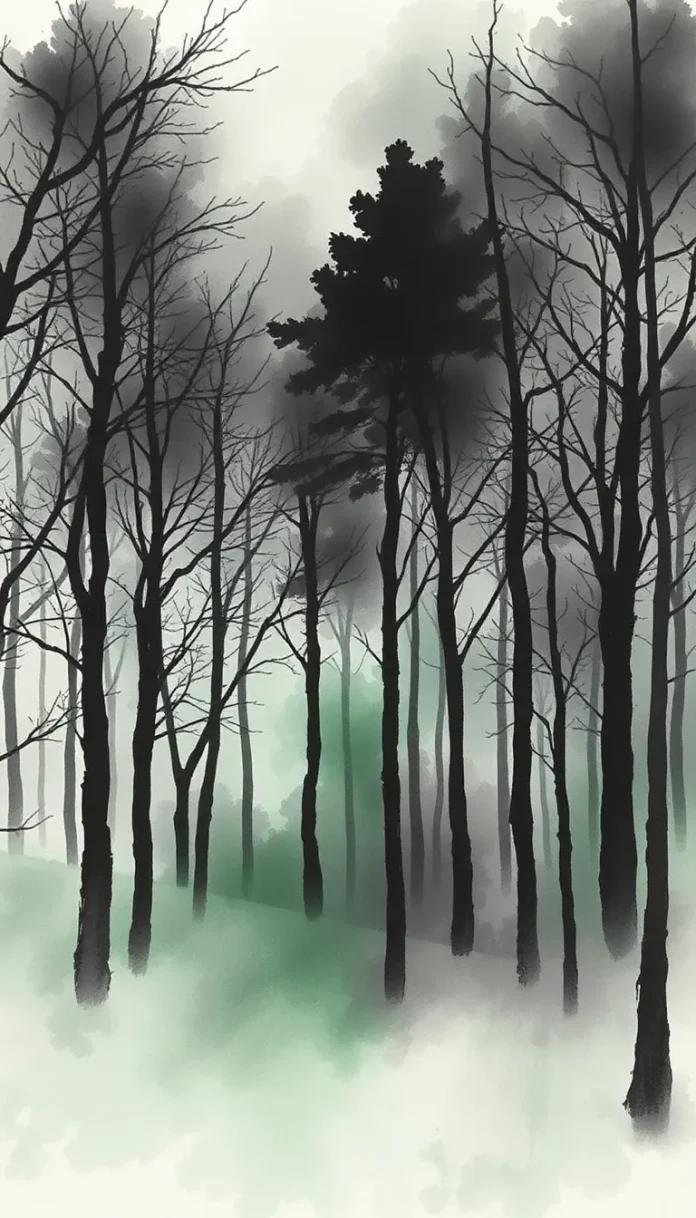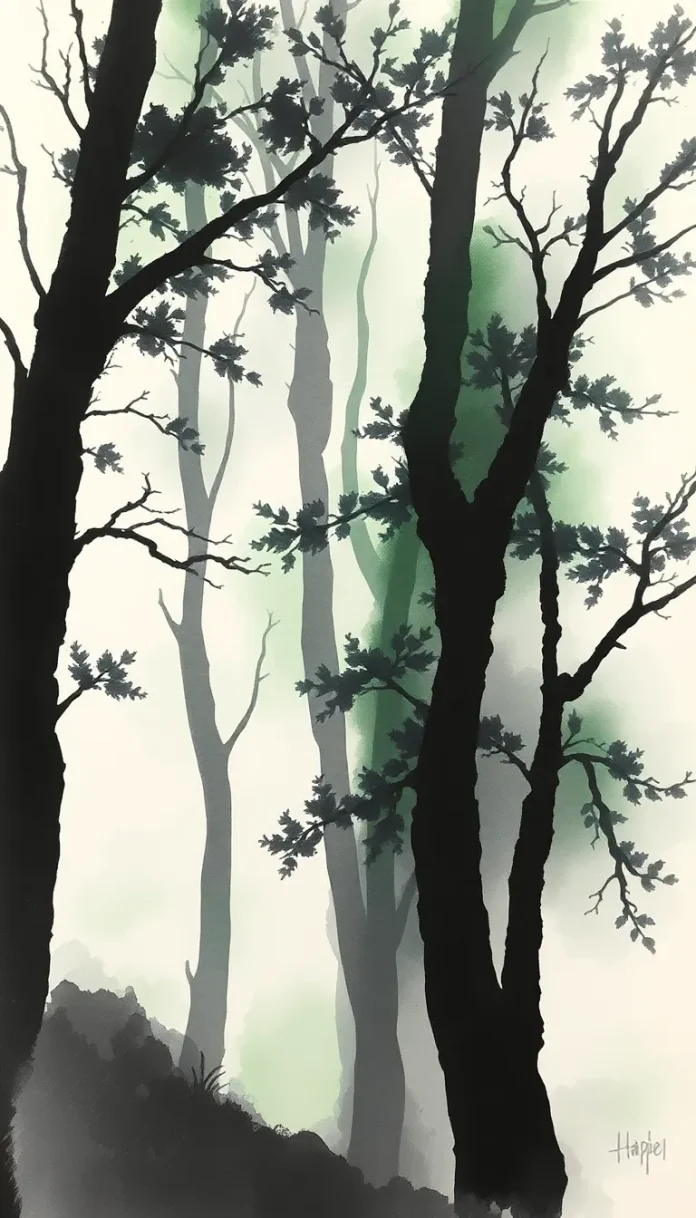The Frozen Echoes of Youth’s Lament
Upon a wintry peak, ‘midst snow and silent pine,
Where frost doth weave a tapestry of endless time,
There wandered one—a young poet, cursed by fate’s design,
Whose tender heart, beset by woe, could scarce the cold align.
From childhood’s golden hours he drew his art sublime,
Yet bound by haunting memories that marred his every line;
A soul entrapped in grief’s embrace, resigned to solitary climb,
Within this realm of ice and sighs, his past a fleeting chime.
II.
O, how he longed to tread again those sunlit fields of youth,
Where innocence like blossoms bloomed, unburdened by the truth
That Time, relentless in its march, erases once so smooth
The corridors of tender dreams—a cruel, inexorable sleuth.
He learned the ways of ancient verse, his every word uncouth
Against the harsh, unyielding chill that robbed his hope of ruth;
This cursed poet, with heart oppressed, sought to retell his youth,
Yet knew too well that passage back was barred by sorrow’s tooth.
III.
Descending from a mount of ice, beneath a sable sky,
He listened to the murmurs of the wind’s forlorn sigh,
That spake in ancient echoes, whispering a last goodbye,
To days of laughter, sunlit mirth, where childhood dreams did lie.
“Return,” they called in echo soft, “to lands where memories vie,
For every tear that falls unshed doth nourish dreams on high.”
Thus, in his breast, a fervent hope, a spark that would not die,
To breach the walls of time’s cold keep and bid the past comply.
IV.
In quiet hours, by candle’s glow, he penned his sad design,
A litany of broken smiles inscribed in every line;
Each verse, a solemn dirge for youth, in icy grace entwined,
Bore witness to the shattered years that Fate had so malign.
He wrote of meadows deep and fair, of streams in sunlit shine,
Of friends once dear and laughter light—the essence now declined;
A chronicle of halcyon days decimated by decline,
Yet in his ink, a trembling hope that memory might realign.
V.
Upon the frozen mountain peak he paused, enraptured there,
Where time itself seemed stilled in awe of nature’s artful snare;
The ancient pines, their branches bowed, with frost did nightly wear,
As if each bough bore life’s regrets, and whispered soft despair.
“O cruel Time!” he cried aloud, “for every cherished fair,
Thou steal’st away the fleeting hours, my soul’s celestial lair;
I, a cursed bard, now seek to mend the broken, lost affair
Between the present bleak and yore’s sweet dreams—so tender, rare.”
VI.
Yet in that fervid cry of heart, the winds did answer low,
“Dear poet, dreams, though vibrant once, must with the winter go,
And hopes to search for past’s embrace shall wander in the snow;
Return thou canst not, for the past is but a ghostly show.”
The mountain’s voice, both stern and sad, did lend his mournful woe,
Each syllable a dirge profound for those long years aglow;
Thus shattered was young heart’s desire, betrayed by Time’s tableau,
That rendered every cherished moment into frost’s eternal blow.
VII.
Remember now the summer’s field, the brook that gently played,
Where once young feet did skip in joy, through glen and dappled glade;
Now frozen lies that vibrant land, each blossom turned to shade,
For memory, so fragile and fleet, in bitter winds doth fade.
The poet, cursed by his own verse, became in solitude arrayed,
A prisoner of bygone days—a soul in endless masquerade;
Yet still he wandered ’midst the snows, by sorrow’s iron blade,
To grasp that fleeting echo of the loves he once conveyed.
VIII.
Beneath the starlit, wintry vault, he met a spectral guide,
A figure clad in shimmering mist, with wisdom deep and wide;
“Come hither, muse of frozen thought,” the phantom thus replied,
“For though the past’s embrace remains forever locked inside.
Your pen may weave the golden threads of memories betide,
But cannot breach the veil of Time where youth and hope abide.
Embrace your fate and let your art with mortal pain collide;
For tragedy, though harsh and grim, brings truth we cannot hide.”
IX.
In that profound and spectral talk beneath the vast array
Of constellations cold and lonely, the poet’s heart gave sway;
He realized the cycle of despair no mortal could allay,
And that the yearning for the once-lost past must ever pay.
“My words, though sweet with hazy dreams, are but a solemn lay,
A epitaph to all that was, to every cherished day;
And yet, in mourning lies a grace,” he mused in soft dismay,
“For sorrow births a rarer art, though death be come to stay.”
X.
Thus armed with newfound, agonized resolve and pen in hand,
He sought to write a final ode—a requiem so grand;
A testament to innocence, to childhood’s fragrant land,
Where every laugh and gentle tear had made the spirit stand.
He etched each verse in measured tone, as though by fate’s command,
Recalling picnics under azure skies and tales once gently manned.
But as his quill inscribed his loss upon that frozen strand,
He felt the sting of Time’s cruel edge, too harsh to withstand.
XI.
The mountain, witness to his grief, became both friend and foe,
As chilling winds and heavy snows conspired to quell his glow;
Within the heart of winter’s court, no vibrant seed could grow,
Instead, a solemn elegy (for youth’s eternal woe) did flow.
And in the silent, spectral dusk, his mind began to know
That every yearning glance back home had sunk beneath the snow;
The path to days of bliss was lost, no warmth to e’er bestow,
For Time had forged an iron lock on childhood’s treasured row.
XII.
A bitter irony enfolded him—his art, though pure and bright,
Could only resurrect the ghost of youth in anguished night.
He read aloud his verses to the winds, in tremulous, waning light,
Yet each recited line cumulated sorrow’s inexorable might.
“My fond childhood, now a phantom through the endless, frozen plight,
I know that I must part with thee, relinquish thy sweet delight;
For cursed be the man who dares to bind the past so tight,
And finds in memory’s mirror a reflection clad in night.”
XIII.
Thus, under heaven’s ice-bound dome, the poet made his stand,
In allegiances with solitude, with grief his only band.
The mountain loomed like ancient fate, its peaks a stark command
That youth, once known, could never be revived by mortal hand.
He rallied every artful word, each strain of lover’s planned,
And cast them forth like shattered dreams upon the frozen land;
In every line, a piece of hope, in every sound, the reprimand
Of a past forever unreachable—an echo dim and grand.
XIV.
As twilight bled to midnight’s chill, his voice grew soft and worn,
The winds, now sibilant in grief, conspired with time forlorn;
Each syllable, a lament deep, upon the ice was sworn,
Declaring that the days of youth, though long past, were never scorned.
Yet fate, that ruthless sculptor, left his heart by torment torn,
For in the act of pleading with the past, the future was aborted,
And every whispered memory, though passionately adorned,
Revealed the truth: no return to youth—the past forever shunned.
XV.
In final act, the poet knelt before the vast, unyielding snows,
His tear-strewn face a mirror to the agony he chose.
He bid farewell to each dear shade—those sweet, ephemeral throes,
Knowing well that dreams once lived must into oblivion close.
“Farewell, dear childhood,” he intoned, “in the silence that now grows;
No miracle shall pull me back to lands where joyous memory flows.”
He wrote his final verse with trembling hand, his spirit overthrows,
And sealed his fate with lethargic sigh, as time’s cold river flows.
XVI.
The final stanza, wrought in grief, a masterpiece of pain,
Resounded like a funeral knell across the frozen plain;
Each word a dirge for days now lost, each line a mournful strain,
For love and innocence, once theirs to claim, now faded in disdain.
His quill, now still, had spoken all—the cost of loss, the bane
Of longing for a past so bright, condemned to cease, in vain.
And as the night devoured his last spark, like tears upon the rain,
He faded into memory’s gloom, adrift on sorrow’s plain.
XVII.
So here, in chronicles of ice and wistful, tear-strewn lore,
Resides the tale of one cursed bard, his spirit evermore
Chained to that childhood dream, now but a distant shore—
A painful, yet transcendent hymn for times that can’t restore.
In every echo of his verse, in every breath the winds implore,
Lies the reminder that the past, though cherished at its core,
Is but a phantom gleaming faintly on a glacial, endless floor,
A truth so heavy, all who dare its weight must bear forevermore.
XVIII.
Dear reader, mark this lament well—the poet’s tragic plight,
For every heart that longs to mend the wrongs of passing light,
Must heed that time’s relentless current spares no soul its right;
Return to days of golden youth is granted not by might.
The mountain stands, a silent guard o’er memories out of sight,
A monument to love and loss, to dreams eclipsed by night.
And thus our poet, with his curse, resigns to endless flight,
His hope a tender, fleeting shimmer lost in winter’s dark and blight.
XIX.
Now, in the quiet aftermath, as dawn alights the frozen crest,
The tale remains—a mournful ode, removed from hope’s warm nest;
A legacy of bittersweet regret, immortalized in jest,
That even brightest childhood suns must dim to twilight’s rest.
The cursed young poet, with lament, did give his all expressed,
By penning lines that echo deep, in sorrow’s silent, stern behest;
And though his heart forever haunts the hills where past is dressed,
We find within his mournful art a soul eternally impressed.
XX.
Thus closes now this elegy, a dirge of grief and rue,
Invoking all the fleeting joys that once in youth we knew;
In every line, a cry for times reclaimed yet ever true,
Though destiny decrees the past a dream we cannot subdue.
For in the mountain’s frozen vast, beneath the sky so blue,
The cursed young poet fades away, his memories bid adieu;
In sorrow’s depths his legacy is carved, as timeless and as due,
A tragic hymn to life’s lost days—from which we all must rue.
So let this verse, so finely wrought with pain and wistful art,
Serve as a timeless mirror to the human, aching heart;
A testament that though our past may from our reach depart,
Its ghost, in every tear we shed, shall never be apart.
For such are the frozen echoes of a childhood torn apart—
A reminder that the path to youth is bound by sorrow’s chart,
And that even in the beauty of our dreams, we each must start
To bid farewell to all we love, ere time itself doth tear apart.


